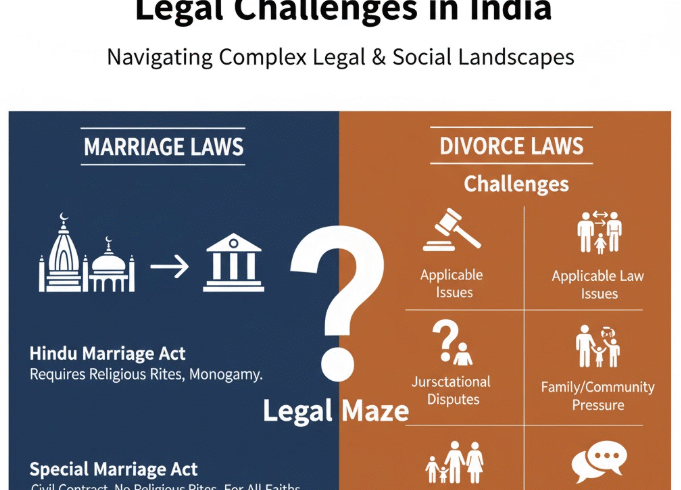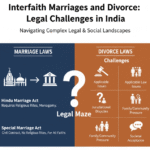Christian Divorce Laws in India: The Need to Know Basics
When a Christian marriage in India hits a rough patch, many couples ask themselves what their legal rights are and how they should proceed. In contrast with certain other communities which have common laws applicable to the entire community, Christians have their distinct personal law since last 100 years. If you are thinking about getting a divorce or want to understand your rights, this guide will take you through everything that you need to know about Christian divorce laws in India.
The Legal Framework of Christian Divorce
In India, Christian marriages are regulated by two big laws, depending on where you live. In most of India, Christians are governed by the Indian Divorce Act 1869 (though there are some small groups for whom the Special Marriage Act is applicable) while in Goa and Pondicherry, Christians are governed by their own respective laws. The Indian Divorce Act was amended in 2001 to make divorce more gender-neutral for both parties, though the law still imposes restrictions on a husband seeking custody of his wife.
Prior to 2001 Christian women suffered discrimination in divorce cases. Husbands could petition for divorce on the basis of adultery alone, but wives had to prove adultery plus another very serious ground. This inequality was at last eliminated, the law being made equal to both parties.
For more detailed information on family law matters, visit https://zistalegalis.com.
Valid Grounds for Divorce
There are limited reasons that the law will consider an end to a Christian marriage. These are the reasons on which both husband and wife have equal right to apply to get divorce. Here are the reasons most commonly held valid by Indian courts:
Adultery (Cheating on Your Spouse)
If your husband or wife has sex with someone else during your marriage, that is adultery. This is a ground for divorce upon which you can file alone. The law does not require you to demonstrate anything else other than the affair.
Cruelty (Physical or Mental Abuse)
Both physical and mental cruelty are included in the meaning of cruelty. This includes:
- Regular beatings or physical harm
- Constant insults and humiliation
- Threats to your life or personal security
- Treating you like a servant
- Spreading lies about your character
- Withholding necessities such as food or clothing
The courts look at the pattern and not just one act. The cruelty has to be serious enough that you can’t live together.
Desertion (Abandonment)
If your partner has left you without a good reason and they haven’t lived with you for at least 2 years in a row, this is considered as desertion. That individual must have departed with the purpose of putting an end to marital unity. Mere separation caused by work or family considerations doesn’t count as desertion.
Conversion to Another Religion
One spouse can obtain a divorce if the other converts to another religion and is no longer Christian. This ground takes into account that religious disparity can alter the very foundation of your marriage.
Mental Illness
You could apply for a divorce if your spouse was insane and had been suffering from such a mental disorder as to be unfit for marriage for at least 2 years before the date of filing. The disease must be incurable, or it may be untreatable and heading towards the terminal stage.
Leprosy
Where one spouse has either a severe or incurable type of leprosy the other may be divorced. But little comes to court on these grounds anymore, as modern medicine has made leprosy treatable.
Venereal Disease
If your spouse had a sexually transmissible infection in communicable form before marriage with knowledge of the fact and you did not know about it, that can serve as a basis for dissolving the marriage. The disease needs to be both serious and potentially harmful to you.
Disappearance
If a spouse has been missing for seven years or more and you have not received any information about whether they are alive, you can file for divorce. This is what allows people to move on when their partner has vanished without a trace.
Additional Grounds Added in 2001
The reforms to the Indian Divorce Act have introduced several new grounds mirroring present day realities:
Living Separately
If you and your spouse have lived separately for two years or more, continuously, either of you can file for divorce. For this ground to be successful, both parties must agree on the divorce. This is akin to “mutual consent divorce” and offers a no-fault option for couples who have simply grown apart.
Not Returning to Cohabitation Following Court Mandate
When a court has made a decree for restitution of conjugal rights (directing spouses to live together) or judicial separation, and one year had passed since the date of such decree, but they have not lived together for that period, either spouse may seek a divorce.
How Divorce Works: The Process Explained
Getting a divorce involves different steps. Here’s what you can expect:
Step 1: Filing the Petition
The petitioner, who is the spouse wishing to divorce, lodges a divorce petition with District Court. It should be in the district where:
- The marriage took place, OR
- The couple were most recently residing together, OR
- Respondent (other spouse) resides
The application must specify the reasons for divorce and provide evidence in support.
Step 2: Serving Notice
The court issues a notice to the other spouse (respondent) telling them that they have been sued for divorce. The respondent has an opportunity to respond and offer their side of the story.
Step 3: Response and Counter-Claims
The respondent can either:
- Agree with the divorce petition
- Argue against it, by providing reasoning as to why the allegation is false
- File cross-claims or claim alimony and custody of children
Step 4: Evidence and Hearings
Each side then presents its evidence to the judge. This may include:
- Witness testimonies
- Medical reports
- Financial documents
- Communication records (messages, emails, letters)
- Police complaints or court orders
The court holds multiple hearings to learn about it all.
Step 5: Final Decree
If there are valid grounds, the court offers a decree of divorce. This officially ends the marriage. The process itself typically lasts between 6 months and 3 years, depending on whether the divorce is contested and how busy the court is.
Mutual Consent Divorce: The Quicker Option
When both husband and wife agree to end the marriage, it is called mutual consent divorce. It’s usually faster and far less painful. Here’s how it works:
Both parties file a joint petition, stating that they have been living apart for at least two years and can no longer cohabit. They will also need to submit a settlement agreement that includes:
- Division of property and assets
- Alimony or maintenance payments
- Child custody and visitation rights
- Any other financial matters
You must wait 6 months from the time you file. This “cooling-off period” allows couples a chance to rethink what they are doing. 6 months (and no later than 18 months) later if both still want the divorce they go to court, explain that it’s their intent to finalize the divorce and the judge issues an order giving them a “Divorce Decree”.
The mutual consent divorce is quicker, cost effective and causes less mental pain than the fault-based dissolution.
Financial Rights: Alimony and Maintenance
The financial side of divorce does not end with the marriage, especially when one spouse makes significantly more than the other. Indian law allows for maintenance (payment of regular funds towards living expenses) and alimony (either lump-sum or periodic payment given after divorce).
Permanent Alimony
Permanent alimony after divorce can be sought under Section 37 of the Indian Divorce Act by either spouse. The court considers several factors:
- The earnings and property of both spouses
- Each person’s ability to earn
- Financial needs and obligations
- Standard of living during marriage
- Age and health of the spouses
- Conduct of both spouses
Alimony in courts is ordered to be 25% to 35% of a husband’s net income (and varies depending on the case).
Maintenance During Divorce Proceedings
During the pendency of the divorce case, where a spouse has no independent income, court has power to direct the other to pay an amount towards maintenance pendente lite. That way they can make it through the legal process with their basic needs accounted for.
| Type of Support | When It’s Paid | How Much |
|---|---|---|
| Temporary Maintenance | During divorce proceedings | Based on immediate needs |
| Permanent Alimony | After divorce is granted | 25-35% of net income (typical) |
| Child Support | Ongoing until child is 18 | Based on the needs of the child and income of parent |
For professional legal assistance with divorce matters, consider consulting experts at https://zistalegalis.com.
Custody of the Children: Who Gets the Kids?
When a marriage with children falls apart, custody can be one of the most emotional and consequential issues. Indian courts take into account the “best interests of the child” while deciding custody.
Types of Custody
- Physical Custody: The child primarily lives with one parent.
- Legal Custody: The authority to make significant decisions regarding the child’s education, health, and well-being.
- Shared Custody: Both parents are responsible for the child and spend equal time with them.
Factors Courts Consider
- The age of the child (infants generally remain with mother)
- Child’s preference (for older children)
- Financial ability of each parent
- Emotional bond with each parent
- Each parent’s lifestyle and character
- Capacity to offer a stable home environment
- Health of both parents
Usually when the children are young (and especially younger than 7), custody is given to the mother, but custodial rights of older children belong equally to both parents. The parent without custody is granted visitation in order to remain a part of the child’s life.
Courts can adjust custody later if circumstances change or the custodial parent is unfit.
Property Division After Divorce
Christian divorce law, unlike Hindu law or Muslim law does not have specific provisions for division of marital property. This produces a certain amount of uncertainty, but the courts have worked out some general principles:
Separate Property
Those assets acquired or inherited before marriage, during marriage by gift usually remain the property of the owner spouse.
Joint Property
Joint property that was bought during a marriage is most often split 50-50, though depending on contribution it could be distributed unequally.
Gifts and Inheritance
Presents made to either of the spouses and property acquired from inheritance or earned in any other way by that member are exclusive property of that spouse.
There are no fixed rules, so property division is often based on the agreement of the parties or determined by the court according to considerations of fairness and each person’s contribution to accumulation of the assets.
Special Case: Annulment – Does This Marriage Even Exist?
Marriage can sometimes be annulled, it does not bear the same meaning as that of divorce. A void marriage is one that has never been legal from the get-go.
Grounds for Void Marriage
- One person was already legally married (that is, bigamy)
- Partners are within prohibited degrees of relationship
- One of the parties to the marriage was impotent from the time of its celebration
- Mental incapacity to consent
- Consent procured by force or fraud
Grounds for Voidable Marriage
- The marriage was not consummated because the other could not
- The person was not capable of giving knowing and voluntary consent, including due to incapacitation resulting from the consumption of alcohol or drugs
- The wife was pregnant by another at the time of marriage
An annulment makes the marriage void as though it never existed, while divorce terminates a valid marriage.
Judicial Separation as an Alternative to Divorce
For couples not yet ready to divorce but unable to live together, judicial separation provides a kind of halfway house. This decree permits the parties to separate and live apart in law though not remarried.
The grounds for separation are the same as divorce. In case of decree for judicial separation, if the spouses do not live together for a period of one year afterwards, it can be converted into a divorce.
Some couples do this for religious reasons or with reconciliation in mind. Learn more about family law in India and related legal provisions.
Recent Developments and Judgments
There are a number of leading Indian cases which contribute to the evolution of Christian divorce law as we see today.
The apex court has ruled that mental cruelty can be something which causes mental agony, even though it may not involve direct violence. Continuous insult in the form of character assassination and refusal to have consummated sex amounts to cruelty, they said.
The Supreme Court in 2017 made it mandatory for courts even hearing mutual consent divorces to verify if both parties are genuinely interested in getting a divorce, and that terms of settlement are fair.
Some courts have also found that a refusal to have children, or the insistence on abortion, can be cruelly treating the spouse.
Common Mistakes to Avoid
When getting divorced, steer clear of these common mistakes:
- Failing to document evidence: Record any incidents, communications and financial transactions.
- Oral agreements: You should never make an agreement unless it is in writing and the court has approved it.
- Using children: Don’t turn the children against the other parent or use them as your messenger.
- Concealing assets: Courts may punish those who conceal property or income.
- Disregarding court orders: Disobeying temporary orders may carry penalties as the case proceeds.
- Over-sharing on social media: Anything you post on the internet can be used against you.
Getting Legal Help
Christian divorce cases are often complicated ones, involving child custody issues, large amounts of assets and allegations regarding cruelty. This is when you definitely need a lawyer:
- Your spouse has retained an attorney
- There are disagreements over children’s custody
- There are substantial assets or property
- You have been charged with cruelty or adultery
- Your spouse is not fully disclosing income or assets
- There’s a domestic violence history
A good divorce lawyer will:
- Explain your rights under the law
- Help gather and present evidence
- Negotiate settlements on your behalf
- Represent you in court hearings
- Ensure paperwork gets filed properly and on time
Frequently Asked Questions
Q1: Can a Christian woman divorce on the ground of adultery only?
Yes. Since the 2001 amendment, Christian women have equal rights as men. A petition for divorce may be filed by either spouse on the ground of adultery alone.
Q2: How long does it take for a divorce in Christian law?
The mutual consent divorce process takes 6 to 18 months on average. A contested divorce may last between 2 to 5 years, but it will depend on the case complexity and how busy the court is.
Q3: What about the cooling-off period with regard to Christian divorce?
Yes but for mutual consent divorce only. Officials are required to wait six months after the filing of a petition before they’re allowed to proceed, that way couples have time to think twice.
Q4: Can I marry again after obtaining a divorce?
Yes. After the divorce decree is granted, and provided 90 days have passed (giving the other party time to appeal), you are free to remarry. Retain your decree of divorce certificate as validation that your previous marriage has been terminated.
Q5: What is the outcome if my spouse fails to answer my divorce notice?
When a spouse does not answer your Petition for Dissolution of Marriage after service, you can seek an ex-parte divorce. The court will hear the case and can enter divorce if there is ground after proof.
Q6: Is the wife awarded alimony by default?
No. Alimony is not automatic. The court will consider income of the parties, ability to earn, needs and other criteria. Husbands can even collect alimony if wives make substantially more money.
Q7: Can I stop my spouse from selling property during divorce?
Yes. You can plead for an injunction to stop your spouse from disposing of property or selling it until the disposal of divorce case. This way your interest in whatever marital property is protected.
Q8: What if my partner resides in another country?
If the marriage was registered in India, or you last lived together as husband and wife in India, there is still a possibility for you to file for divorce here. The court can give notice through diplomatic channels, but that takes longer.
Final Thoughts
The process of separation in marital relationship among the Indian Christians is governed by Indian Christian Marriage Law. Although getting a divorce is always difficult, understanding your legal rights and the process can help you make informed decisions when you need them most.
Whether you’re contemplating divorce or want to learn your options, keep in mind that no two cases are the same. The law offers different bases and methods, but their applicability finds its tenor in the facts of a given case.
If you’re experiencing marital issues, consider counseling or mediation ahead of seeking legal recourse. In many cases, courts are now providing services in marriage counseling to work out differences. But if a divorce is going to happen, get the right legal advice up front, document everything and move forward with your head held high.
The 2001 amendments gave Christian divorce law greater fairness and modernity by abolishing gender discrimination and introducing practical grounds, such as living apart. These laws are also being reinterpreted by the courts to be more in line with people’s values today while preserving the sanctity of marriage as society changes.
However you decide to proceed, do so with as much detail, patience and legal support to make the best situation for everyone involved, particularly any children affected by the situation.
For expert legal consultation on Christian divorce matters, visit https://zistalegalis.com





